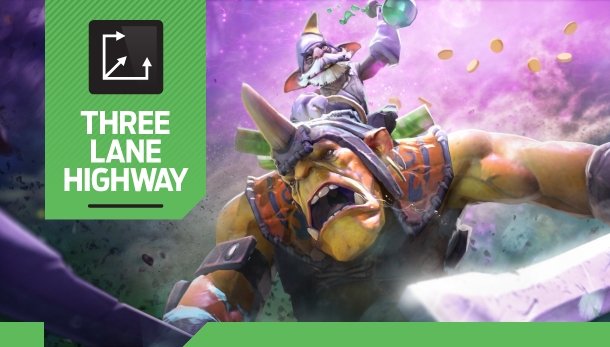Three Lane Highway: why The International's prize distribution should change this year

Three Lane Highway is Chris' sometimes silly, sometimes serious column about Dota 2.
Last year I arrived in Seattle a couple of days before The International began. Being ahead of schedule meant spending a few afternoons hovering around the hotel where the players were housed, watching the group stages and trying to grab interviews with whoever I could. Some of that material ended up in the feature that I subsequently wrote about the tournament, but a lot of it didn't.
Every player I spoke to was keen to point out that the prize money wasn't as important to them as being able to say that they were the best in the world at something. Despite that, many players felt dissatisfied with the way the prize pool itself was divided up.
Last year, sixteen teams took part in The International. First place took 50% of the prize pool, second place took 22%, and subsequent placements earned 10%, 7%, 4% and 1.5% until 8th place, after which point teams went home with nothing. Finishing 7th and 8th nonetheless earned Liquid and Fnatic $43,116 each, the kind of money that would make for a grand prize in any other tournament.
This year's Compendium has been incredibly successful. Less than a week after its launch, the crowdfunded prize pool is scraping the underside of $5 million. That's crazy. According to the numbers on Cyborgmatt's tracker , that means that the 7th and 8th place finishers at this years tournament could be making upwards of $75,000 - as long as Valve stick to the same distribution pattern as last year.
I'd like to argue that they shouldn't. Last year, several of the players I spoke to pointed out that the lack of a prize for 8th-16th place finishers was a missed opportunity. Maintaining a steady income is a huge challenge for pro gamers, and much of what Valve have done with Dota 2 has been done with the aim of solving that problem. Compendium cards, pro player cosmetic sets, pennants: Valve want to find a way to build a stable business environment for e-sports, without assuming central control over the scene as Blizzard did with StarCraft II.
Part of the answer, I think, is establishing prizes for every finisher at The International. Simply getting to the tournament is a huge achievement - the quality of play in the American qualifiers this week testifies to that - and rewarding that achievement with guaranteed cash doesn't seem like it would dilute the competition. Nobody is going to be happy with $10,000 when they could be winning a million-plus. And the money would give teams an incentive to stick together in the months that followed the International, avoiding the spate of dissolutions that struck teams like Dignitas and Mousesports after they bowed out of the tournament early.
Keep up to date with the most important stories and the best deals, as picked by the PC Gamer team.
Distributing 0.25%-0.5% of the prizepool to the bottom eight finishers wouldn't put a dent in the vast amount of money that the Compendium is capable of raising. We're talking about prizes vastly in excess of what is available to teams throughout the rest of the year. This is an opportunity to distribute that money more evenly across the scene as a whole, using the draw of The International to inject funds into teams that otherwise might not get another shot at a big title. The money isn't everything, at the end of the day, but it's a problem - a problem that Valve are in a position to solve.
If you enjoyed this article, you can find more of Chris' Dota columns by clicking here.
Joining in 2011, Chris made his start with PC Gamer turning beautiful trees into magazines, first as a writer and later as deputy editor. Once PCG's reluctant MMO champion , his discovery of Dota 2 in 2012 led him to much darker, stranger places. In 2015, Chris became the editor of PC Gamer Pro, overseeing our online coverage of competitive gaming and esports. He left in 2017, and can be now found making games and recording the Crate & Crowbar podcast.


